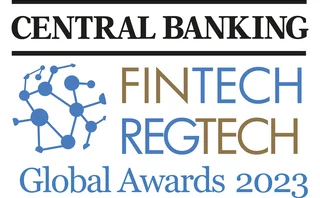
The winners of the 2023 FinTech RegTech Global Awards
Sixth annual tech awards recognise excellence among central banks and the private sector


Central Banking unveiled the winners of its sixth annual FinTech RegTech Global Awards today (June 14), recognising the technological achievements of central banks, supervisors and commercial tech providers.
The 11 awards highlight official institutions’ success in cyber resilience, central bank digital currency (CBDC) ecosystem innovation and the use of artificial intelligence (AI) in regtech and suptech. Firms were recognised for their use of AI and machine learning to fight money laundering and fraud, and support international regulatory compliance, as well as work building CBDC infrastructure and setting global ethical AI standards.
Explore the 2023 awards hub to find out more about the winners. The press release is available here.
Central banks and supervisors
The Global Impact award went to the Bank of Lithuania for its fintech Newcomer Programme overseen by the newly created Centre for Financial Market Development. The central bank has shown a commitment to responsible sector growth by adding to its supervisory capabilities, as fintech continues to evolve at pace.
“We are ready to help companies that create value for consumers,” Lukas Jakubonis, chief business development officer at the Bank of Lithuania, says. “In return, we expect a mature attitude towards business development. It must go together with compliance.”
With the Bank of Mongolia’s big data project, the banking sector entered a new data era. The Pioneer award recognises the central bank’s unified data model, which pulls granular data daily from all banks in its jurisdiction. The new data points allow more comprehensive stress-testing, including by geographic region and sector. The project was developed in part with knowledge-sharing with the Bank of Korea.
Bank of Mongolia governor Byadran Lkhagvasuren commented on the importance of data innovation and international collaboration: “Building on this achievement, we look forward to continuing to explore the power of big data and its potential to shape the future of central banks and financial systems worldwide.”
The award for CBDC Initiative went to the National Bank of Georgia (NBG) for its work on a CBDC ecosystem. It sees CBDCs as more than just another means of payment. The central bank is working towards a platform that offers smart contract and programmable token features, aimed at encouraging innovation in the financial sector.
Vice-governor Papuna Lezhava of the NBG says the central bank identified gaps in financial infrastructure and services, and designed its CBDC to address those areas with contextualised use cases. “NBG’s stakeholder-centric CBDC platform will complement existing payment channels, including the upcoming instant payments system, and provide a safe foundation for private sector innovations in order to meet society’s current and future needs.”
As financial technology continues to rapidly evolve, so too are cyber threats to financial stability evolving. The Central Bank of the Philippines (BSP) won this year’s Cyber Resilience Initiative for ASTERisC*, its cloud-based regtech and suptech solution. ASTERisC* automates the central bank’s cyber security supervision, while streamlining compliance for institutions. “I am proud that ASTERisC* puts the BSP at the forefront of achieving swift, co-ordinated and intelligence-driven cyber security supervision,” says governor Felipe Medalla. “ASTERisC* serves as a monumental precedent for future digital initiatives of the BSP.”
Also recognised for its forward-looking regulatory and supervisory technology was the European Central Bank’s (ECB’s) new natural language processing (NLP) AI tool, which is helping to address blind spots. Athena will allow over 1,000 supervisors to analyse more than 5 million documents across the Single Supervisory Mechanism. The ECB was this year’s recipient of the Artificial Intelligence award.
“It is a great honour to receive the Central Banking award in the field of AI,” Frank Elderson, member of the ECB’s executive board and vice-chair of the ECB’s supervisory board, says. “Combining supervisory technologies with the expertise of our supervisors allows us to be forward-looking and adapt quickly to the continuously changing environment.”
Market leaders
This year’s Global Technology Partner award went to Accenture for work with the Monetary Authority of Singapore towards ethical AI. Project Veritas was set up to define a methodology, along with a toolkit, for financial institutions to implement principles of fairness and transparency, while holding the executive to account.
Ripjar took the prize for Anti-Money Laundering Technology Partner. Founded by former British Government Communications Headquarters (GCHQ) staff, the company draws on experience in the UK security and intelligence community in its product design. Labyrinth uses advanced machine learning to read through millions of news articles in 22 languages every day, identifying those that contain risks relating to money laundering and entity matching to create AI risk profiles.
The award for Technology Partner for Regulatory Compliance went to Mitratech this year. Mitratech’s Alyne governance, risk and compliance platform also uses NLP to identify and help firms meet regulatory requirements, across legislation worldwide.
R3 has worked with central banks such as the Bank of Canada, Banque de France, Bank of Japan, the ECB, Sveriges Riksbank and the National Bank of Kazakhstan. It won this year’s CBDC Partner award for Corda, its permissioned distributed-ledger technology platform, on which central banks are testing and developing their CBDCs. R3 recently signed a contract with the Central Bank of the United Arab Emirates.
QI Tech has developed Pix Anti-Fraud, which verifies loans through the Central Bank of Brazil’s payments system and scooped the Cyber Security Partner award this year.
Online PSB Loans won this year’s Open Finance Partner award. It is behind India’s largest lending portal, which uses AI and machine learning to offer credit even to individuals and businesses without a credit history and avoid non-performing assets through advanced analytics.
Only users who have a paid subscription or are part of a corporate subscription are able to print or copy content.
To access these options, along with all other subscription benefits, please contact info@centralbanking.com or view our subscription options here: http://subscriptions.centralbanking.com/subscribe
You are currently unable to print this content. Please contact info@centralbanking.com to find out more.
You are currently unable to copy this content. Please contact info@centralbanking.com to find out more.
Copyright Infopro Digital Limited. All rights reserved.
As outlined in our terms and conditions, https://www.infopro-digital.com/terms-and-conditions/subscriptions/ (point 2.4), printing is limited to a single copy.
If you would like to purchase additional rights please email info@centralbanking.com
Copyright Infopro Digital Limited. All rights reserved.
You may share this content using our article tools. As outlined in our terms and conditions, https://www.infopro-digital.com/terms-and-conditions/subscriptions/ (clause 2.4), an Authorised User may only make one copy of the materials for their own personal use. You must also comply with the restrictions in clause 2.5.
If you would like to purchase additional rights please email info@centralbanking.com





